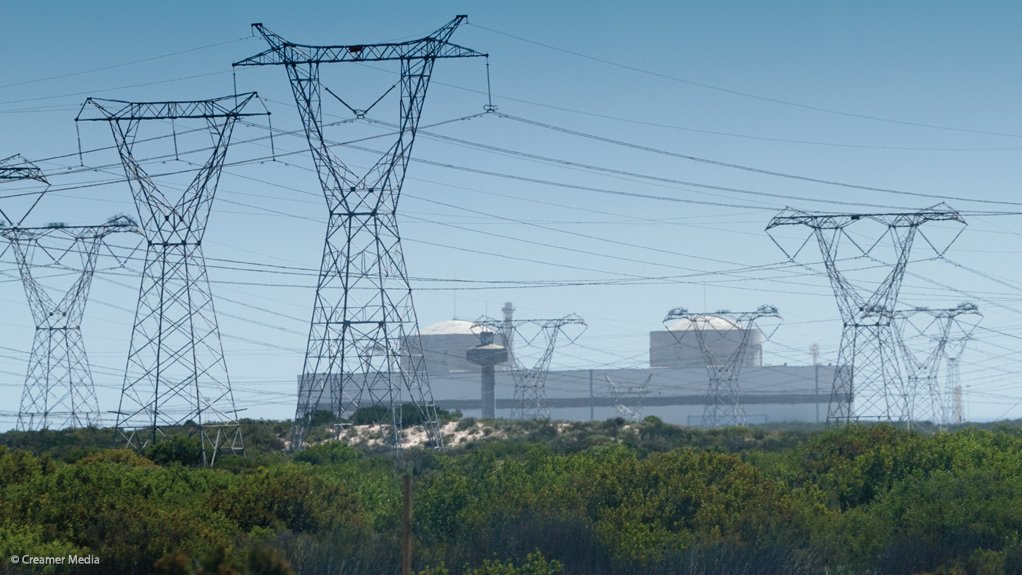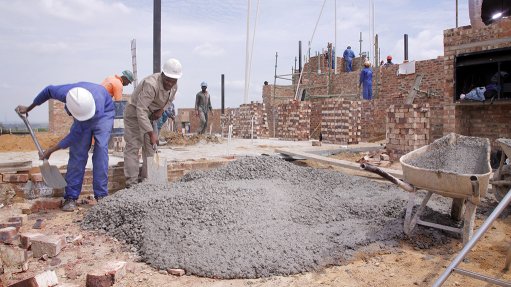New nuclear build dependent on future electricity demand, financing
Low growth in electricity demand in South Africa will delay, or eliminate. the need for new nuclear power plants. So warned Eskom Transmission Division Energy Planning and Market Development Department Power System Economics chief adviser Keith Bowen, while addressing a recent Academy of Science of South Africa (ASSAf) symposium, in Pretoria. He highlighted that, regarding electricity in South Africa, the “biggest issue is the drop in demand” over the past five years. “Even though electricity demand has been pretty much flat, the economy has grown as we predicted.” South Africa’s “electricity intensity” has decreased.
This decrease began before the current electricity crisis and has not been caused by the state of the economy (which has grown, albeit slowly). The key factor, he suggested, was the price of electricity. This raised the issue of what will happen when South Africa restores its electricity supply to comfortable and secure levels. He observed that pricing might prevent an increase in the demand for electricity. He predicted that electricity demand would not resume its previous growth rate.
If one assumes a target annual economic growth rate of 5.4% over the next 20 years, the level needed to reduce poverty in the country, this would now only need an increase in electricity supply of 2.8% a year. While the country is unlikely to achieve economic growth of 5.4% a year, if the electricity supply does not increase at 2.8% a year, that 5.4% target will not be achievable. “If demand grows at a very low level, nuclear wouldn’t be the preferred option,” said Bowen. “If there is low growth, then, under those conditions, we wouldn’t build nuclear before 2035.
“We don’t compare nuclear with solar [power], you don’t compare nuclear with wind [power]. They provide a different service,” he explained. “Nuclear really is competing with gas, coal and coal with carbon capture and storage.” Nuclear power does lack flexibility – it is operated at a certain level or it is not built at all. In comparison, for example, a gas power plant can be operated at different output levels. Nevertheless, “[t]here is a role for nuclear”.
As for coal, regarding climate change, South African policy is that there should be a carbon emissions cap, leading to a decline in carbon emissions. Consequently, the country could build new coal power plants until that cap is reached. The preference is to build smaller coal power plants, not major projects like the current Medupi and Kusile projects.
Then there is the question of financing new nuclear power plants (NPPs). South Africa may have difficulty in doing this, University of Cape Town Energy Research Centre director Professor Harald Winkler cautioned the ASSAf symposium.
“Eskom has a R225-billion shortfall for its current build programme,” he pointed out. “Government is providing R350-billion in debt guarantees. Total government debt is R1.4-trillion, with a worsening debt-to-gross domestic product ratio. Servicing the debt costs R115-billion. There is little room for further guarantees.”
The nuclear companies that would supply the new NPPs could offer financing for the proposed new build programme. Russia has done so. But the issue then becomes the provisions of the con-tracts. What would South Africa be locked into?
This, in turn, raised the question of the trans-parency of a new NPP programme. Would the tender process be transparent? Would the process be run internally by Eskom, as was the case during the abortive Nuclear 1 project during 2008? Would the decisions be based on good technical analyses or on international political considerations (regarding relations with China, France, Japan, Russia, South Korea and the US)? “The process should be transparent,” he affirmed.
The Energy Research Centre has estimated South Africa’s energy demand at 341 terawatt hours (TWh) in 2030, compared with the 454 TWh forecast by the original Integrated Resources Plan 2010. Lower demand would mean no need for any new NPPs before 2040, at a probable price of $7 000/kW. Higher demand would allow new NPPs from 2029, at $5 000/kW. In both cases, the decision would have to be made ten years before.
He noted that, over the past decade, the cost of nuclear energy had increased. During the period 2003 to July 2013, the 34 reactors that had been started had taken an average of 9.4 years to complete. While coal had a lower capital expenditure than nuclear, it had higher operating costs. Renewables, like nuclear, required higher capital expenditure, but their operating expenditure was very low, as they essentially had no fuel cost
“Both over- and underbuild of power plants are expensive to the South African economy and society,” affirmed Winkler. “It’s risky to bet in demand projections. What we need is flexible planning.”
Comments
Press Office
Announcements
What's On
Subscribe to improve your user experience...
Option 1 (equivalent of R125 a month):
Receive a weekly copy of Creamer Media's Engineering News & Mining Weekly magazine
(print copy for those in South Africa and e-magazine for those outside of South Africa)
Receive daily email newsletters
Access to full search results
Access archive of magazine back copies
Access to Projects in Progress
Access to ONE Research Report of your choice in PDF format
Option 2 (equivalent of R375 a month):
All benefits from Option 1
PLUS
Access to Creamer Media's Research Channel Africa for ALL Research Reports, in PDF format, on various industrial and mining sectors
including Electricity; Water; Energy Transition; Hydrogen; Roads, Rail and Ports; Coal; Gold; Platinum; Battery Metals; etc.
Already a subscriber?
Forgotten your password?
Receive weekly copy of Creamer Media's Engineering News & Mining Weekly magazine (print copy for those in South Africa and e-magazine for those outside of South Africa)
➕
Recieve daily email newsletters
➕
Access to full search results
➕
Access archive of magazine back copies
➕
Access to Projects in Progress
➕
Access to ONE Research Report of your choice in PDF format
RESEARCH CHANNEL AFRICA
R4500 (equivalent of R375 a month)
SUBSCRIBEAll benefits from Option 1
➕
Access to Creamer Media's Research Channel Africa for ALL Research Reports on various industrial and mining sectors, in PDF format, including on:
Electricity
➕
Water
➕
Energy Transition
➕
Hydrogen
➕
Roads, Rail and Ports
➕
Coal
➕
Gold
➕
Platinum
➕
Battery Metals
➕
etc.
Receive all benefits from Option 1 or Option 2 delivered to numerous people at your company
➕
Multiple User names and Passwords for simultaneous log-ins
➕
Intranet integration access to all in your organisation





















